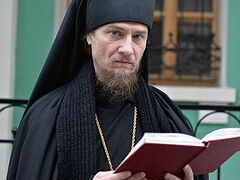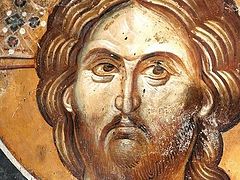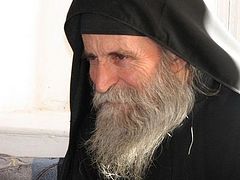This final part in our series on humility from His Eminence Metropolitan Athanasios of Limassol of the Church of Cyprus, based on the teachings of St. John Climacus in The Ladder of Divine Ascent, continues with his analysis of the signs of humility.
Further, St. John Climacus says:
The first and paramount property of this excellent and admirable humility is the acceptance of indignity with the greatest pleasure, when the soul receives it with outstretched hands and welcomes it as something that relieves and cauterizes diseases of the soul and great sins (25.7).
A man who has succeeded in humility joyfully accepts such unpleasant things as accusations, slander, neglect, contempt, and derision. I knew a man who unfortunately committed suicide because he couldn’t endure the insults that others inflicted upon him. Indeed, slander is very difficult to endure. But when they are slandered, when they are looked at with contempt or generally considered worthless, those who have acquired virtues and have drawn near to holiness will accept these humiliations, as St. John says, with outstretched arms—with joy.
I remember how our Elder Joseph told us in one talk:
“I long to find myself on some square and be spat on by the passing crowd.”
Just imagine, this man wanted to be slandered and dishonored, that his name would be tarnished. He wasn’t a masochist, but he knew what grace visits the humiliated man. Elder Paisios said:
“I have never known a greater grace than that which descends upon an aggrieved man. I have tasted great grace thanks to prayer, fasting, and vigil, but that grace that has visited me when people have insulted, humiliated, and slandered me was the strongest.”
Why is that? Because you become like the Lord.
“He who endures abuse becomes like the reviled Christ, and the reviled Christ comes to the heart of this humiliated man and remains there forever,” said Elder Paisios.
Further,
The second property is the loss of all bad temper (25.7).
Again about anger. That is, every manifestation of it: an evil look, irony, any of our spiteful movements—all of this goes away if we have humility.
The third and highest degree is a true distrust of one’s good qualities and a constant desire to learn (25.7).
This means that a humble man puts a question mark next to every one of his deeds. He says: “It’s good that I was able to do it, but will the Lord accept it? Who knows how God will look at it?” That is, he doesn’t have this absolute, audacious confidence in the perfect deed. And St. John adds:
and a constant desire to learn (25.7).
The humble man feels the need to learn more, and not to say he knows everything. He who says he knows everything actually knows nothing. Sometimes a man comes to share his problem, to hear the opinion of another, but he starts talking and there’s no stopping him. Then I ask myself: “What did he come for? Does he really need my opinion? Or does he just want to tell me his opinion?” You see how often people have no desire to learn. If you only knew how much the greatest saints, including the elders of our times, whom I knew, desired to listen. There were times when we young monks naively thought that the Elder was interested in hearing our stories. I remember how I went up to him and told him:
“Geronda, you know, I went to such and such a monastery, to such and such an elder, and I saw this and that…”
And Geronda replied:
“What’s that you say? Seriously? What a beautiful thing he said to you! What a wonderful idea! See what kind of people there are around us!”
 Elder Sophrony (Sakharov) I remember how when our Elder Joseph of Vatopedi read one of Elder Sophrony (Sakharov)’s books, he wanted to go to England to meet with him. Let me remind you that our Elder had lived with such great spiritual personalities as Elder Joseph, Elder Ephraim, Fr. Charalampos, and having absorbed their spiritual experience, rose to the same level as these outstanding spiritual fathers. I really wanted to go to England then too but I didn’t know how to dare tell the Elder about it. But then I resolved: “Geronda, shall we go together?” He answered: “If you organize everything…” And all this despite the fact that the Elder considered it a great insult to his person to cross the border of that country. The thing is that the Elder bore witness to those times when Cyprus was officially part of the British Empire, and therefore the Elder was offended for his country. But he overcame himself and went to England to meet with Elder Sophrony.
Elder Sophrony (Sakharov) I remember how when our Elder Joseph of Vatopedi read one of Elder Sophrony (Sakharov)’s books, he wanted to go to England to meet with him. Let me remind you that our Elder had lived with such great spiritual personalities as Elder Joseph, Elder Ephraim, Fr. Charalampos, and having absorbed their spiritual experience, rose to the same level as these outstanding spiritual fathers. I really wanted to go to England then too but I didn’t know how to dare tell the Elder about it. But then I resolved: “Geronda, shall we go together?” He answered: “If you organize everything…” And all this despite the fact that the Elder considered it a great insult to his person to cross the border of that country. The thing is that the Elder bore witness to those times when Cyprus was officially part of the British Empire, and therefore the Elder was offended for his country. But he overcame himself and went to England to meet with Elder Sophrony.
When we arrived, he was like a little child or an elementary school student. When he saw Fr. Sophrony, he said: “Geronda, we’ve come to hear your word.” He listened to Elder Sophrony, riveted, hanging on every word. And when Elder Sophrony, another spiritual giant of our times, said to him the next day: “Geronda, we’re organizing a monastic meeting tomorrow so you can talk with the brothers and sisters of the monastery,” Fr. Joseph said: “Geronda, how dare I speak in your presence? I can’t.” So Elder Sophrony didn’t come to this meeting, so as not to make Elder Joseph uncomfortable. This was a case where they both learned from one another.
Every time the Elder had to make a difficult decision, he would go to Katounakia to meet with Elder Ephraim and ask him what to do. And when the time would come to make a decision, Elder Ephraim himself, a great clairvoyant, who spoke directly with the Lord, would turn to our Elder or even to the younger monks and ask: “What should I do? Should I do it like this, or like that?” So you see, the elders wanted to hear, to learn, to discover. None of them would say they knew everything. They were people replete with humility.
Our Elder would often recount an episode from the life of Abba Pachomius, that luminary of the whole universe, who led a brotherhood of several thousand monks. Once Abba Pachomius told the young Monk Theodore, twenty-five years old, to say an edifying word for the brethren, and himself sat down to listen. Some of the older monks were displeased, so Abba Pachomius reproached them, saying: “I, your elder, listened to him with great attention and was benefited by it, and you’re indignant that he was too young.”
There was another case with St. Pachomius the Great. One day Abba Pachomius was sitting, weaving some baskets—a familiar handicraft for those desert places—when suddenly one of the orphan boys who lived at the monastery came to him. Not knowing it was the abbot, the boy said to him: “Abba, why are you weaving like that? You should do it differently.” St. Pachomius said to him: “Really, my child? Show me how to do it.” The boy took the basket and started showing him how. Do you think this boy could show anything new to this elder who had studied this handicraft for so many years in the desert? Of course the boy didn’t have greater experience in it, and his work turned out to be sloppy, but the Elder attentively looked at the boy’s work and did as he had shown him. It didn’t cause the Elder any annoyance or perturbation, because his heart was filled with the grace and blessing of the Holy Spirit. A holy man is easily ready to become a disciple, and he’ll never say: “What, don’t I know that myself? Who are you?...”
Then St. John Climacus says:
He who has taken humility as his bride is above all gentle, kind, full of compunction, sympathetic (25.10).
There are people who don’t have any sympathy for others, who condemn them… But even if they’re right, and, let’s say what they say is true, still, a merciful heart can’t look at another with ill will. There are those who are easily touched, who easily come to compunction, grieve, and repent. They are pleasant and amiable, and you approach them with rejoicing. You see such a man, and the soul relaxes, it comes to rest. As it says in the Patericon, he’s like a bed on which you lie down and rest. And there are other people who are like a bed of nails. Where will you rest and get enough sleep there? The mere sight of such a bed is terrifying enough.
St. John also says that the humble man is “calm, bright, compliant” (25.10). It’s easy to communicate with him. He tells you: “Do as you like, whatever suits you.” For him there are no problems or difficulties. He’s not a burden to anyone. I’ve known holy people who spoke this way, and it didn’t cause them any negative feelings. After all, often when people say: “Do as you like, brother,” you think you’re being used, that you’re a victim and a fool in this situation. But in fact, the opposite is true here. When you behave this way with your brother, you soften him, you gain a friend. You’re the one who wins, not the other. You’ll lose nothing.
The humble man is “bright;” that is, he never grieves about anything. He’s in a state of balance, in peace; he is “vigilant” and “not indolent.”
And (why say more?), the saint continues, free from passionl; for the Lord remembered us in our humility, and delivered us from our enemies (Ps. 135:23-24), and our passions and impurities (25.10).
The humble man is like a tranquil sea which nothing can agitate and disturb. He is filled with God’s peace, because the Lord doesn’t leave him, because of the great humility that has settled in his soul.
It is one thing to be humble, another to strive for humility, and another to praise the humble (25.19).
The first is the perfect state, as St. John says further on. The perfect man is a humble man. You can tell him anything you want, and his heart won’t get excited, for it has become as strong as stone; it’s like an unshakable foundation. The other, who’s in the middle, labors to acquire humility, tries to think with humility, to have good thoughts about everything. Of course, he’s not yet perfect; there’s a battle going on with him, and opposing thoughts come. And the third work is the praise of the humble, which belongs to all believers. The Christian believer who loves Christ will praise the humble, as well as any of his fellow men. He always says only good things about others.
A certain elder went to the desert, and along the way he stopped into a kallyva. The elder there asked him:
“Where are you going, Abba?”
“I’m going to see Elder P.”
“Oh, he is a great elder! Well done deciding to visit him. He’s a holy man! An earth angel!”
 Metropolitan Athanasios of Limassol The monk was surprised by the elder’s words. When he arrived to Elder P., he heard from him:
Metropolitan Athanasios of Limassol The monk was surprised by the elder’s words. When he arrived to Elder P., he heard from him:
“Where are you coming from?”
“Along the way I stopped into Elder N.’s kallyva, and he told me very good things about you!”
And the elder told him:
“He who praises his brother is much holier than the one he praises.”
To praise another is a great virtue. We try to at least not say anything bad. For example, when we’re asked about a certain person whom we have negative thoughts about, we try to restrain ourselves from saying everything we think about them. And in doing so we also think we’re not sinning. Some say: “It’d be better for me to keep quiet, so as not to sin,” or they say: “Yes, he’s a good guy, but…” As the holy Elder Paisios said, it’s like spoiling the whole egg with some chicken droppings that sometimes remain on the shell and can fall into the egg when we crack it. If this happens, we have to throw the whole egg into the trash. The man of God thinks differently—he doesn’t notice anything bad in others. If they ask him: “Is he a good man?” he answers: “Very good! Wonderful!” Unfortunately, it’s hard for us to say good things about others.
And you know what the most terrible thing is? That this occurs even in families. How many fathers don’t say any good things to their children. Is it really so hard for you to praise your son, to say what a good boy he is? Instead, the father makes fun of him, humiliates him, or hurts him with some sharp word. That’s why we have so many unhappy children today. Such a cold attitude is most often found among fathers in Cyprus. I don’t know why, whether it’s our inarticulateness, or egotism, but I see how hard it is for Cypriot fathers to say kind words to their children. And so these children grow up in need of a good word.
I met with some children at a school this year. I went with Fr. Heraclidius. I spoke with the children and answered their questions. I should note that I’m sixty now, and I talk with them like a grandfather, since I’m old enough to be their grandfather. When the meeting was over and we were heading out, we noticed a fifteen-year-old boy following after us. Timidly approaching me, he said: “Forgive me, Father, could you give me a hug?” I was taken aback; it was quite unexpected. Then, of course, I hugged him (what difference does it make what they say about me?). I told him: “What a wonderful child you are!” And he said to me: “Couldn’t my father say that to me?” Then he started crying. And I thought, what kind of father is that?...
Know that people are in need of our kind word. I myself didn’t understand this at one time, and I only learned about it once I was on the Holy Mountain. One wise elder, when he would hear how we young monks talked—rather sharply and carelessly, as is often the case among the youth—took me aside and said: “Sweeten your words, Father! Bread is much more pleasant with honey than with vinegar.” And this elder himself always had a soft word, even when disagreeing and defending his point of view. In his example, we saw how precious this quality is. This is all a consequence of humility.
The heart of the man of God has within it a well of humility. It doesn’t just have a certain conviction or position, but “streams forth the lifegiving water of humility;” it streams forth a host of Divine thoughts; it’s filled with grace and sweetness, bringing all who are nearby into a state of peace. When we see a humble man, we notice the light that he radiates and we say: “He’s like the sun!” And in this sunlight we see the true beauty of man, when he’s truly the image and likeness of God. Let us pray to God, that He might give us this spirit of humility, and that the humble Christ might settle in our hearts. Amen.




